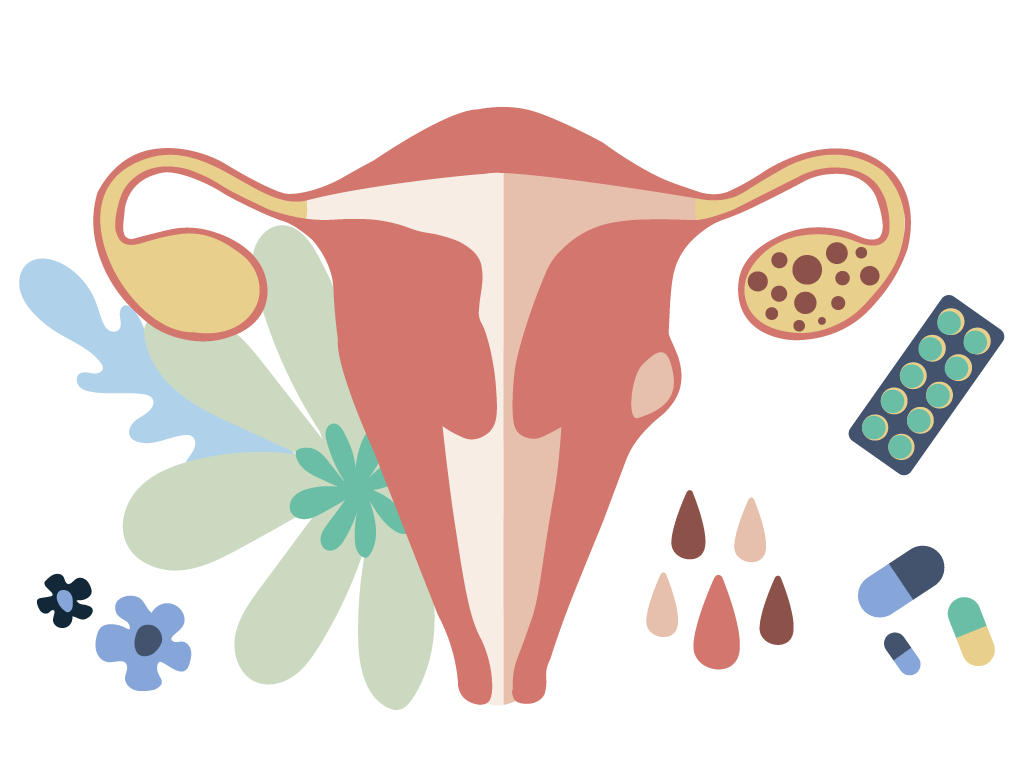This article is compiled by Sanjana Varma, a freelance writer of Proactive For Her. Linkedin: https://www.linkedin.com/in/sanjana-varma-b34a63141/
What is PCOS?
Polycystic ovary syndrome, or PCOS, is a hormonal condition that women can get during their childbearing years. Persons suffering from PCOS usually have one or more of the following -
- Irregular periods both inflow and frequency
- Acne and unwanted body and facial hair
- Heightened risk of other health problems, including diabetes and high blood pressure
You can get treatments for the symptoms. And you could be able to get pregnant, although you may need to take medicines to improve your fertility.
Treatment
Treatment will depend on your symptoms, your age, and whether you want to become pregnant. If you’re overweight, losing a little -- even 5% to 10% of your weight -- can help to improve insulin resistance.. It also might help the way your medications work and improve your fertility.
If you aren’t planning to get pregnant, your doctor might prescribe hormonal birth control, like the skin patch or the pill. These medications can help lower your risk of endometrial cancer, get your periods on track, clear up acne, and lessen extra body hair. If you do want to get pregnant, fertility medications can help your ovaries release eggs.
Nutrient Deficiency Associated With PCOS
Polycystic Ovary Syndrome (PCOS) is associated with a range of nutrient deficiencies. Even if you are eating a nourishing , balanced based diet that contains ample vegetables, fruits, and proteins, it is still possible to become deficient in certain nutrients due to the disease process. Your body may lack important vitamins, minerals and micronutrients.
How Does Vitamin Deficiency Affect PCOS?
Any healthy diet plan needs a balanced repository of vitamins and minerals. However, dieticians often get carried away, trying to focus on the “macros.” Macronutrients consist of carbohydrates, proteins and fat. Studies show that women with PCOS are often at risk of nutrient deficiencies in some common minerals like potassium and magnesium. In terms of vitamins, B12 and B9 are usually present in insufficient amounts. The deficiency of Vitamin D is also linked with PCOS, depression and insulin resistance.
Common Nutritional Deficiencies In PCOS Patients
Magnesium
Magnesium is a trace mineral present in abundance in the human body. It plays an important role that helps in our metabolism, blood sugar levels, blood pressure and muscle function. Women with PCOS have a deficiency of magnesium. Moreover, taking contraceptive pills can lower magnesium level in your body.
To boost your magnesium intake, you can take the following foods:
– Nuts (hazelnuts, almonds)
– Vegetables (potatoes, spinach)
– Grains (oats, rice, sorghum, teff, barley)
Vitamin D
Vitamin D is important for the regulation of reproductive hormones such as Follicle-Stimulating Hormone (FSH), progesterone levels and Anti-Mullerian Hormone (AMH) which can affect pregnancy. Vitamin D also helps reduce insulin resistance and improves blood sugar levels.
Up to 85 percent of women with PCOS have a Vitamin D deficiency. The risk is naturally elevated if they’re living in regions where sunlight is sparse. The inadequacy is often considered a leading cause of infertility among PCOS women. It also increases testosterone levels and inflammation in the body.
Studies have shown that vitamin D supplementation improves fertility, decreases testosterone levels, and lowers inflammation) in women with PCOS.
Some foods you can take to boost your Vitamin D levels:
– Eggs
– Fortified milk and other dairy products
– Orange and honey
Zinc
Just like magnesium, zinc is a trace mineral that plays a key role in our body’s enzyme activity. Zinc helps regulate the menstrual cycle and promotes fertility. When present in combination with magnesium, the two nutrients are capable of curbing PCOS symptoms like acne, hair loss, high testosterone, inflammation and hirsutism. However, if you’re taking birth control pills then you’re actively depleting zinc levels in your body.
Here are some foods to help you boost your zinc levels.
– Spinach, Pomegranates, Mushrooms
– Kidney beans and Peanuts
– Seeds (sunflower seeds, pumpkin seeds)
Vitamin B12
Tiredness, despite sleeping well, is a common sign of a vitamin B12 deficiency. That’s because B12 helps red blood cells carry oxygen around the body. Without sufficient amounts, it can make a person feel extremely tired all day long. Tiredness can also be caused by other factors overlooked in people with PCOS.
Vitamin B12 is essential in:
- Red blood cell formation, DNA synthesis, and nerve function.
- To lower PCOS and obesity
This vitamin is found primarily in animal foods, so the risk for deficiency is higher in vegetarians and vegans. An increase in vitamin B12 can ward off symptoms and make you better. Here are some foods you should be incorporating in your diet:
– Meat (Beef, Liver, Pork)
– Potatoes,Green peas and Carrots
– Dairy products
Folate
Folate is also known as Vitamin B9 and is naturally occurring in leafy green vegetables. Folic acid, on the other hand, is a synthetic version of the vitamin, produced in controlled lab settings.
Folate is a necessary vitamin for women with PCOS since it reduces chronic inflammation, balances blood sugar and lipid levels in the body. You may consume the following folate-rich foods:
- Spinach, Broccoli and Apple
- Brown bread, Oatmeal and Brown rice
- Beef, Salmon and Halibut
Vitamin E
Vitamin E is a lipid-soluble vitamin and regulates the balance between antioxidant and oxidant systems. Besides, new evidence confirmed that vitamin E could improve endometrial (Inner lining of the uterus ) thickness in women with unexplained infertility, and the effects were attributed to its anticoagulant and antioxidant effects. Another study showed that Vitamin E and Omega-3 fatty acid co-supplementation in women with PCOS for 12 weeks provided significant improvement in androgen levels.
Rich sources of Vitamin E are :
- Peanut, Almonds and Sunflower seeds
- Mango, Avocado and Pumpkin
- Red bell pepper, Asparagus and Spinach
Calcium
Calcium is an essential micronutrient and is involved in many areas of female reproductive development and fertility. Furthermore, Ca deficiency could be related to the risk of obesity because the insulin signalling pathway is Ca dependent. Biochemical studies have shown that decreased Ca levels are observed in obese women with PCOS when compared with healthy women.
Calcium level in your body can be increased with the help of
- Milk and dairy products
- Leafy green vegetables
- Bread and anything made with fortified flour
Chromium
Chromium is a mineral that is found in certain foods and in the environment. Chromium supplements are often used as a weight-loss aid and to control blood sugar. Chromium works by aiding the action of insulin in the body. Insulin is essential for metabolism and storage of carbs, fats, and proteins in the body. How it functions in the body as a supplement is not well known. It is found in a variety of foods but the amount in each type of food is not always easy to determine.
A wide variety of foods contain chromium and most researchers agree that a majority of the population gets enough through food, including:
- Broccoli
- Grape juice
- Whole wheat bread
Selenium
Selenium is an effective essential element against oxidative stress and is required for the development of reproductive organ systems in our body. Biochemical studies have shown that women with PCOS have lower levels of selenium compared to other women.
Selenium is a trace mineral that is found naturally in the soil and also appears in certain foods. There are even small amounts in the water you drink. Something that makes it valuable is its role in antioxidant activity. That is key for repairing tissues throughout the body.
It can also help to enhance resistance against diseases and effects of stress.Here are the top foods high in selenium:
- Brazil nuts
- Salmon
- Cottage Cheese
PCOS can be kept in check with timely treatment and lifestyle changes. Diet and exercise can help you control the effects of this condition.
This information is provided for educational purposes and should not be construed as medical advice. Please consult with your healthcare practitioners before undertaking any changes in your diet or adding supplements.
We at Proactive aim at creating a world-class medical experience for Indian women and adopt gold standards in every healthcare initiative whether it’s a teleconsultation or a webinar. What sets us apart from the rest is our liberal, convenient, and holistic approach to healthcare.
Proactive is a digital clinic for women, offering accessible, personalized, and confidential health-care solutions. We offer products and services for out-patient health concerns of Indian women, across their lifetime - from puberty to pregnancy to menopause. To know more on the sexual and reproductive health of women, visit https://www.proactiveforher.com/
Disclaimer: This article is for informational purposes only and should not be construed as a substitute for medical advice or treatment.

